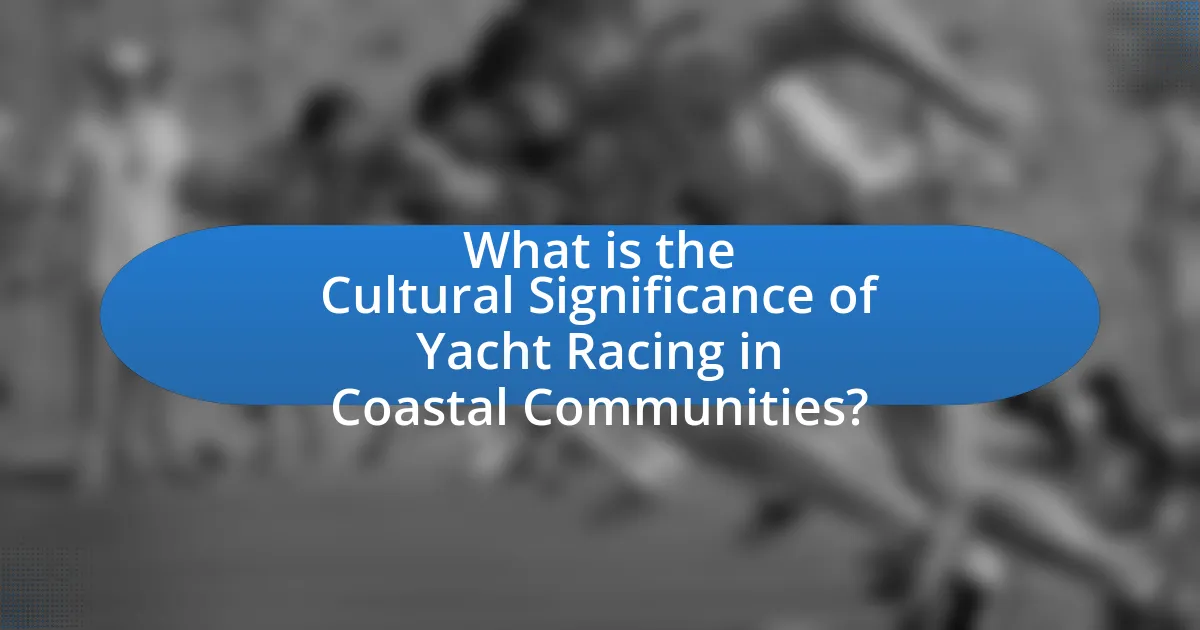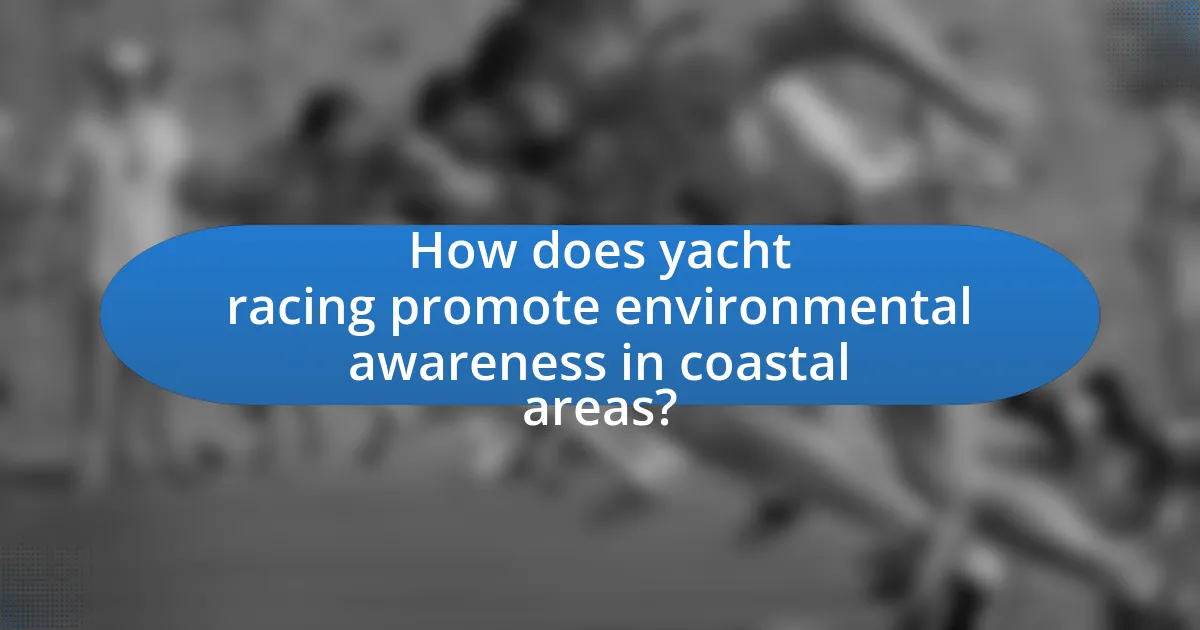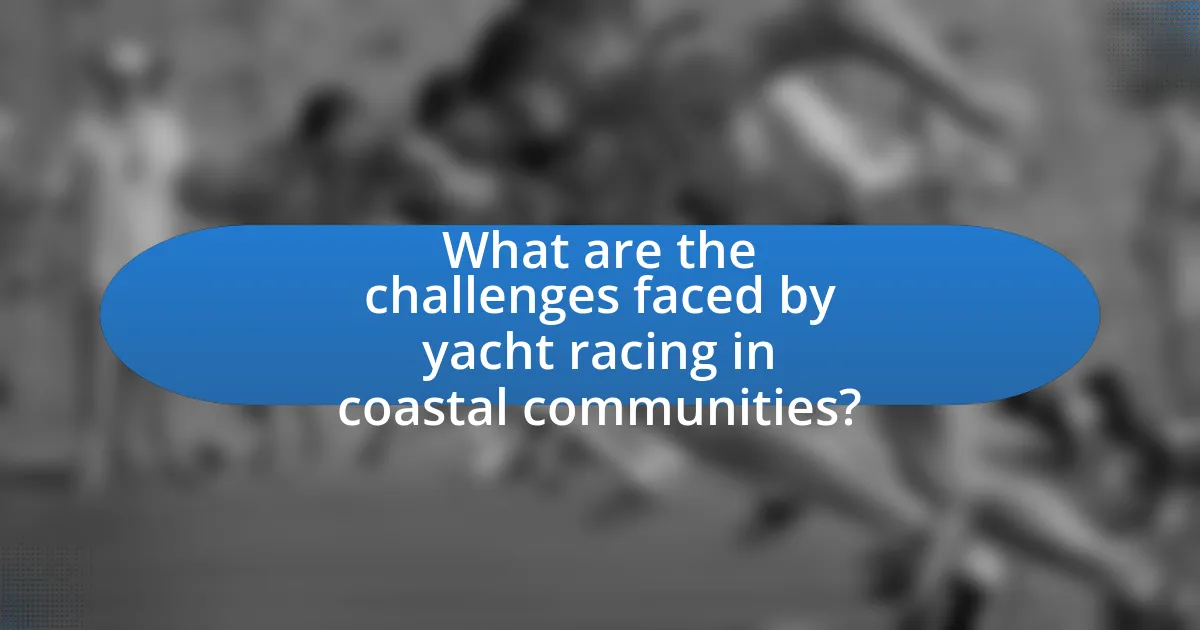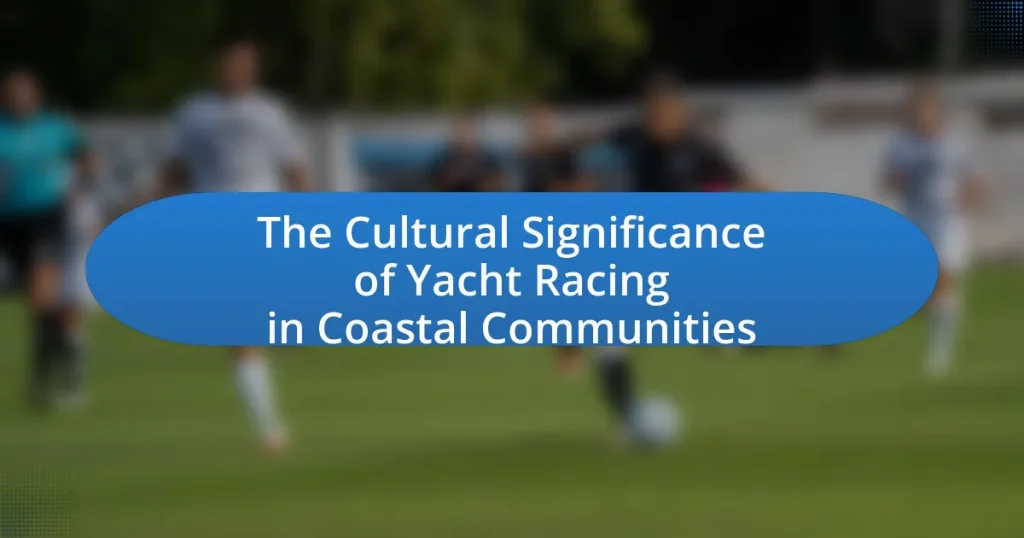Yacht racing is a culturally significant activity in coastal communities, serving as a catalyst for local identity, community engagement, and economic development. The tradition reflects maritime heritage, with events like the America’s Cup and local regattas enhancing community pride and stimulating tourism. Yacht racing influences local customs by integrating traditional practices and fostering social cohesion, while also promoting environmental awareness through initiatives aimed at marine conservation. Despite facing challenges such as economic pressures and environmental concerns, yacht racing remains a vital part of the social and economic fabric of coastal areas, contributing to both community identity and local economies.

What is the Cultural Significance of Yacht Racing in Coastal Communities?
Yacht racing holds significant cultural importance in coastal communities as it fosters local identity, community engagement, and economic development. The tradition of yacht racing often reflects the maritime heritage of these areas, with events serving as a celebration of local history and craftsmanship in boat building. For instance, events like the America’s Cup and local regattas not only attract participants but also draw spectators, enhancing community pride and cohesion. Furthermore, yacht racing stimulates local economies through tourism, as visitors contribute to hospitality and retail sectors during racing events. This combination of cultural celebration and economic benefit underscores the integral role yacht racing plays in the social fabric of coastal communities.
How does yacht racing influence local traditions and customs?
Yacht racing significantly influences local traditions and customs by fostering community engagement and promoting maritime heritage. In coastal communities, yacht racing events often become focal points for local celebrations, integrating traditional music, food, and crafts into the racing experience. For instance, events like the America’s Cup have historically included local festivals that showcase regional culture, attracting both participants and spectators, thereby reinforcing local identity. Additionally, yacht racing encourages the preservation of traditional boat-building techniques and sailing practices, as communities strive to maintain their unique maritime legacies. This cultural exchange not only enhances social cohesion but also stimulates local economies through tourism and related activities.
What specific cultural practices are associated with yacht racing?
Yacht racing is associated with several specific cultural practices, including the organization of regattas, the establishment of yacht clubs, and the celebration of maritime traditions. Regattas serve as competitive events that foster community engagement and showcase local sailing talent, often accompanied by festivities that highlight regional culture. Yacht clubs play a crucial role in promoting sailing as a lifestyle, offering social gatherings, training programs, and networking opportunities for enthusiasts. Additionally, maritime traditions such as the blessing of the fleet and the use of nautical terminology in everyday language reflect the deep-rooted connection between coastal communities and their seafaring heritage. These practices collectively reinforce the cultural identity and social cohesion of communities involved in yacht racing.
How do local festivals incorporate yacht racing?
Local festivals incorporate yacht racing by organizing competitive sailing events that attract participants and spectators, enhancing community engagement and tourism. These festivals often feature yacht races as a central attraction, showcasing local maritime culture and skills. For example, events like the Newport Bermuda Race and the St. Maarten Heineken Regatta not only include yacht racing but also celebrate local traditions, music, and food, creating a festive atmosphere that draws visitors. This integration of yacht racing into local festivals fosters a sense of pride and identity within coastal communities, while also contributing to the local economy through increased visitor spending.
Why is yacht racing important for community identity?
Yacht racing is important for community identity because it fosters a sense of belonging and pride among residents. This competitive sport often serves as a focal point for local culture, bringing together individuals from diverse backgrounds to participate in or support events. For instance, coastal communities frequently organize regattas that not only showcase sailing skills but also highlight local traditions, history, and maritime heritage. Such events can attract tourism, stimulate local economies, and strengthen social ties, reinforcing the community’s unique identity.
How does yacht racing foster a sense of belonging among residents?
Yacht racing fosters a sense of belonging among residents by creating a shared community experience centered around teamwork, competition, and local pride. Participants and spectators engage in social interactions during races, which strengthens community ties and encourages collaboration among residents. Events such as regattas often involve local businesses and organizations, further integrating yacht racing into the cultural fabric of coastal communities. Studies have shown that such communal activities enhance social cohesion, as evidenced by increased participation rates in local events and a stronger sense of identity among residents.
What role does yacht racing play in the historical narrative of coastal communities?
Yacht racing serves as a significant cultural and economic pillar in the historical narrative of coastal communities. Historically, yacht racing has fostered community identity and pride, often becoming a central social event that brings together residents and visitors alike. For instance, events like the America’s Cup, which began in 1851, have not only showcased maritime skills but also stimulated local economies through tourism and related industries. Additionally, yacht racing has played a role in the preservation of maritime traditions and skills, as communities engage in the construction and maintenance of racing vessels, thereby sustaining local craftsmanship and heritage. This interplay of social, economic, and cultural factors illustrates how yacht racing is woven into the fabric of coastal community history.
In what ways does yacht racing contribute to economic development?
Yacht racing contributes to economic development by generating significant revenue through tourism, job creation, and local business stimulation. Events such as the America’s Cup and various regattas attract thousands of spectators and participants, leading to increased spending in hospitality, retail, and transportation sectors. For instance, the 2017 America’s Cup in Bermuda generated an estimated $200 million in economic impact, showcasing how yacht racing can drive financial growth in coastal communities. Additionally, yacht racing fosters investment in infrastructure, such as marinas and event facilities, further enhancing local economies.
How does yacht racing impact local businesses and tourism?
Yacht racing significantly boosts local businesses and tourism by attracting large crowds and generating economic activity. Events such as regattas draw participants and spectators, leading to increased spending in hotels, restaurants, and retail shops. For instance, the 2019 America’s Cup in Bermuda reportedly contributed over $200 million to the local economy, showcasing how yacht racing can serve as a catalyst for tourism and business growth. Additionally, yacht racing events often lead to increased visibility for the host community, encouraging repeat visits and long-term tourism development.
What are the financial benefits of hosting yacht racing events?
Hosting yacht racing events generates significant financial benefits, including increased tourism, local business revenue, and sponsorship opportunities. These events attract thousands of spectators and participants, leading to heightened hotel bookings, restaurant patronage, and retail sales in coastal communities. For instance, the 2017 America’s Cup in Bermuda reportedly contributed over $200 million to the local economy through tourism and related spending. Additionally, yacht racing events often secure sponsorship deals with major brands, further injecting capital into the local economy. This combination of tourism influx and corporate investment underscores the financial advantages of hosting yacht racing events.

How does yacht racing promote environmental awareness in coastal areas?
Yacht racing promotes environmental awareness in coastal areas by engaging participants and spectators in the preservation of marine ecosystems. The competitive nature of yacht racing often includes educational initiatives that highlight the impact of pollution and climate change on coastal environments. For instance, events frequently incorporate clean-up activities and workshops focused on sustainable practices, fostering a sense of responsibility among sailors and the community. Additionally, yacht racing organizations often collaborate with environmental groups to raise funds and awareness for coastal conservation efforts, demonstrating a commitment to protecting marine habitats. This combination of competition and community involvement effectively raises awareness about environmental issues, encouraging proactive measures to safeguard coastal areas.
What initiatives are taken by yacht racing organizations to protect marine ecosystems?
Yacht racing organizations implement various initiatives to protect marine ecosystems, including adopting sustainable practices, promoting environmental awareness, and engaging in conservation efforts. For instance, the World Sailing organization has established guidelines for environmentally responsible racing, which include minimizing waste and using eco-friendly materials. Additionally, events like the Volvo Ocean Race have integrated ocean health campaigns, such as the “Turn the Tide on Plastic” initiative, which raises awareness about plastic pollution and encourages participants to engage in clean-up activities. These initiatives are supported by research indicating that yacht racing can significantly influence public attitudes towards marine conservation, thereby fostering a culture of environmental stewardship within coastal communities.
How do yacht races raise awareness about ocean conservation?
Yacht races raise awareness about ocean conservation by engaging participants and spectators in discussions about marine ecosystems and environmental issues. These events often incorporate educational programs, partnerships with conservation organizations, and initiatives that promote sustainable practices among sailors and attendees. For instance, many yacht races now include environmental challenges that encourage teams to adopt eco-friendly strategies, such as reducing waste and using sustainable materials. Additionally, high-profile races attract media attention, amplifying messages about the importance of protecting ocean habitats and the impact of climate change on marine life. This combination of direct engagement and broader visibility effectively fosters a culture of conservation within coastal communities and beyond.
What partnerships exist between yacht racing and environmental groups?
Partnerships between yacht racing and environmental groups include collaborations aimed at promoting sustainability and ocean conservation. For instance, the Ocean Race has partnered with organizations like the World Wildlife Fund (WWF) to raise awareness about marine protection and climate change. These partnerships often involve initiatives such as clean-up campaigns, educational programs, and the implementation of sustainable practices within the racing community. The collaboration between yacht racing events and environmental groups highlights a commitment to preserving marine ecosystems while engaging the public in environmental stewardship.
How does yacht racing encourage sustainable practices among participants?
Yacht racing encourages sustainable practices among participants by promoting environmental awareness and responsible resource management. Participants often engage in initiatives such as using eco-friendly materials for boat construction, implementing waste reduction strategies, and participating in clean-up activities during events. For instance, many yacht racing organizations have adopted guidelines that require the use of biodegradable products and the reduction of single-use plastics, which directly contributes to minimizing marine pollution. Additionally, educational programs associated with yacht racing events often emphasize the importance of preserving marine ecosystems, thereby fostering a culture of sustainability within the community.
What measures are taken to minimize the environmental impact of yacht racing?
Yacht racing organizations implement several measures to minimize environmental impact, including the use of eco-friendly materials in boat construction, waste management protocols, and adherence to strict regulations regarding emissions and fuel usage. For instance, many racing events now require the use of biodegradable products and promote recycling initiatives among participants and spectators. Additionally, some yacht races have adopted clean energy sources, such as solar power, to reduce reliance on fossil fuels. These measures are supported by environmental guidelines established by governing bodies like World Sailing, which emphasizes sustainability in the sport.
How do participants promote eco-friendly practices in their communities?
Participants promote eco-friendly practices in their communities by organizing and participating in local clean-up events, advocating for sustainable boating practices, and educating others about environmental conservation. For instance, yacht racing communities often implement waste reduction strategies during events, such as using biodegradable materials and encouraging recycling. Additionally, studies show that community engagement in environmental initiatives can lead to increased awareness and participation in sustainability efforts, as seen in the “Coastal Clean-Up Campaign” which reported a 30% increase in local volunteer participation over five years.

What are the challenges faced by yacht racing in coastal communities?
Yacht racing in coastal communities faces several challenges, including environmental concerns, economic pressures, and regulatory issues. Environmental challenges arise from the impact of racing on marine ecosystems, such as disturbances to wildlife and water quality degradation. Economic pressures include the high costs of maintaining racing facilities and the need for sponsorship, which can strain local resources. Regulatory issues often involve navigating complex maritime laws and local ordinances that can restrict racing activities. These factors collectively hinder the growth and sustainability of yacht racing in these communities.
How do economic fluctuations affect yacht racing events?
Economic fluctuations significantly impact yacht racing events by influencing sponsorship, participation, and overall funding. During economic downturns, companies often reduce marketing budgets, leading to fewer sponsorships for yacht racing events, which can diminish the scale and quality of these competitions. For instance, the 2008 financial crisis saw a notable decline in corporate sponsorships across various sports, including yacht racing, resulting in reduced prize money and fewer participating teams. Conversely, during periods of economic growth, increased disposable income allows for greater investment in yacht racing, enhancing event visibility and participation. Historical data shows that events like the America’s Cup have thrived during economic booms, attracting more teams and spectators, which underscores the correlation between economic conditions and the vibrancy of yacht racing events.
What are the financial challenges for organizing yacht races?
The financial challenges for organizing yacht races include high costs for permits, insurance, and logistics. Organizers must secure funding for race infrastructure, such as docks and safety equipment, which can be substantial; for example, the cost of safety boats and medical support can exceed tens of thousands of dollars. Additionally, securing sponsorships is often difficult, as potential sponsors may be hesitant to invest in events with uncertain attendance or weather-related risks. Furthermore, marketing expenses to attract participants and spectators can strain budgets, especially in competitive coastal markets where multiple events vie for attention. These financial hurdles can significantly impact the feasibility and success of yacht racing events.
How do changes in tourism impact yacht racing participation?
Changes in tourism significantly impact yacht racing participation by influencing the availability of resources, sponsorship, and local interest. Increased tourism often leads to greater investment in coastal infrastructure, which can enhance facilities for yacht racing events. For instance, regions that experience a surge in tourist activity may see improved marinas and event venues, attracting more participants. Additionally, higher tourist numbers can lead to increased sponsorship opportunities, as businesses seek to capitalize on the visibility of yacht racing events. According to a study by the International Council on Clean Transportation, regions with robust tourism economies often report a 20% increase in participation rates for local yacht racing events, demonstrating a clear correlation between tourism growth and yacht racing engagement.
What environmental challenges threaten yacht racing in coastal areas?
Yacht racing in coastal areas faces significant environmental challenges, primarily due to climate change, pollution, and habitat degradation. Climate change leads to rising sea levels and increased storm intensity, which can disrupt racing schedules and damage infrastructure. Pollution from urban runoff and maritime activities contaminates coastal waters, affecting marine life and the health of ecosystems essential for yacht racing. Additionally, habitat degradation, such as the destruction of mangroves and coral reefs, diminishes biodiversity and impacts the natural beauty that attracts participants and spectators to yacht races. These factors collectively threaten the sustainability and cultural significance of yacht racing in coastal communities.
How do climate change and pollution affect yacht racing conditions?
Climate change and pollution significantly impact yacht racing conditions by altering wind patterns, sea temperatures, and water quality. Rising global temperatures can lead to more extreme weather events, affecting race schedules and safety. For instance, increased frequency of storms can disrupt planned races, while changes in wind patterns can create unpredictable sailing conditions. Additionally, pollution, such as plastic debris and chemical runoff, can degrade water quality, posing risks to both the environment and the health of participants. Studies indicate that regions heavily affected by pollution experience reduced marine biodiversity, which can further impact the racing experience and the ecological balance of coastal communities.
What steps are being taken to address these environmental challenges?
Efforts to address environmental challenges in yacht racing include implementing sustainable practices, such as using eco-friendly materials in boat construction and promoting waste reduction initiatives during events. Organizations like the World Sailing have introduced guidelines for reducing carbon footprints and enhancing marine conservation efforts. Additionally, yacht racing events are increasingly partnering with environmental NGOs to raise awareness about ocean health and promote responsible sailing practices. These steps are validated by the growing number of regattas adopting sustainability certifications, reflecting a commitment to environmental stewardship within the sport.
What are best practices for fostering community engagement in yacht racing?
Best practices for fostering community engagement in yacht racing include organizing local events, promoting educational programs, and encouraging volunteer participation. Local events, such as regattas and open houses, create opportunities for community members to experience yacht racing firsthand, fostering interest and involvement. Educational programs, including sailing lessons and workshops, help demystify the sport and attract new participants, particularly youth. Encouraging volunteer participation in races and community activities not only builds a sense of ownership but also strengthens social ties among residents. These practices have been shown to enhance community cohesion and promote a shared identity centered around yacht racing, as evidenced by successful yacht clubs that report increased membership and local support following such initiatives.
How can local organizations effectively promote yacht racing events?
Local organizations can effectively promote yacht racing events by leveraging community engagement, social media marketing, and partnerships with local businesses. Engaging the community through events such as open houses or sailing clinics can increase interest and participation, as evidenced by the success of similar initiatives in coastal towns where yacht racing is a cultural staple. Utilizing social media platforms allows organizations to reach a broader audience, with statistics showing that 73% of marketers believe that their efforts through social media marketing have been “somewhat effective” or “very effective” for their business. Additionally, forming partnerships with local businesses can enhance visibility and provide mutual benefits, as seen in successful yacht racing events that have collaborated with local sponsors to create promotional packages.
What strategies can be implemented to involve youth in yacht racing?
To involve youth in yacht racing, organizations can implement mentorship programs that pair experienced sailors with young participants. These programs foster skill development and provide a supportive environment, encouraging youth to engage in the sport. Additionally, offering accessible training sessions and workshops can demystify yacht racing, making it more approachable. According to a study by the Royal Yachting Association, youth participation in sailing increased by 30% when local clubs provided free introductory courses and community events. Furthermore, integrating yacht racing into school curricula can promote interest and participation among students, as evidenced by programs in coastal schools that have successfully increased youth involvement by incorporating sailing into physical education.


